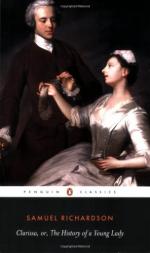Then they recollected that her posthumous letters, instead of reproaches, were filled with comfortings: that she had in her last will, in their own way, laid obligations upon them all; obligations which they neither deserved nor expected; as if she thought to repair the injustice which self-partiality made some of them conclude done to them by her grandfather in his will.
These intelligences and recollections were perpetual subjects of recrimination to them: heightened their anguish for the loss of a child who was the glory of their family; and not seldom made them shun each other, (at the times they were accustomed to meet together,) that they might avoid the mutual reproaches of eyes that spoke, when tongues were silent—their stings also sharpened by time! What an unhappy family was this! Well might Colonel Morden, in the words of Juvenal, challenge all other miserable families to produce such a growing distress as that of the Harlowes (a few months before so happy!) was able to produce.
Humani generis
mores tibi nosse volenti
Sufficit una domus:
paucos consume dies, &
Dicere te miserum,
postquam illinc veneris, aude.
Mrs. Harlowe lived about two years and an half after the lamented death of her Clarissa.
Mr. Harlowe had the additional affliction to survive his lady about half a year; her death, by new pointing his former anguish and remorse, hastening his own.
Both, in their last hours, however, comforted themselves, that they should be restored to their blessed daughter, as they always (from the time they were acquainted with the above particulars of her story, and with her happy exit) called her.
They both lived, however, to see their son James, and their daughter Arabella, married: but not to take joy in either of their nuptials.
Mr. James Harlowe married a woman of family, an orphan; and is obliged, at a very great expense, to support his claim to estates, which were his principal inducement to make his addresses to her; but which, to this day, he has not recovered; nor is likely to recover; having powerful adversaries to contend with, and a title to assert, which admits of litigation; and he not blessed with so much patience as is necessary to persons embarrassed in law.
What is further observable, with regard to him, is, that the match was entirely of his own head, against the advice of his father, mother, and uncles, who warned him of marrying in this lady a law-suit for life. His ungenerous behaviour to his wife, for what she cannot help, and for what is as much her misfortune as his, has occasioned such estrangements between them (she being a woman of spirit) as, were the law-suits determined, even more favourably than probably they will be, must make him unhappy to the end of his life. He attributes all his misfortunes, when he opens himself to the few friends he has, to his vile and cruel treatment of his angelic sister. He confesses these misfortunes to be just, without having temper to acquiesce in the acknowledged justice. One month in every year he puts on mourning, and that month commences with him on the 7th of September, during which he shuts himself up from all company. Finally, he is looked upon, and often calls himself,




